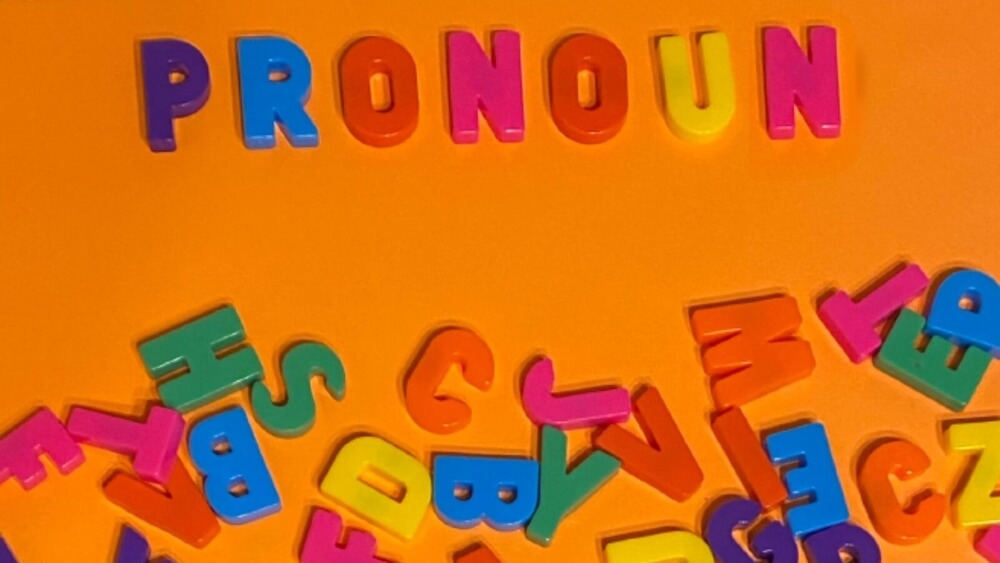Personal pronouns in Japanese work differently than in English. Depending on which personal pronouns you use, they can give the listener completely different impressions. So, understanding this distinction and choosing the appropriate personal pronoun is important. This article explains the types, usage, and impressions of Japanese pronouns, with example sentences and native pronunciation.
Japanese Personal Pronouns
Definitions and Roles
To understand Japanese personal pronouns, it is necessary to first understand the differences between Japanese and English personal pronouns. In English, “I” is used when referring to oneself as the subject, and “You” is used to refer to the listener, and these are called personal pronouns.
However, in Japanese, strictly speaking, it doesn’t use personal pronouns; instead, it employs nouns to represent oneself or others, and there are quite a few types of such nouns. For example, “I” can be translated as “watashi,” “ore,” or “boku” or others. A characteristic of Japanese so-called personal pronouns is that they reflect the relationship between the speaker and the listener, emotions, or even the speaker’s gender or age. In other words, in Japanese, it could be said that it is necessary to carefully choose personal pronouns depending on the context or situation.
Furthermore, it is important to note that in Japanese, subjects and objects are often omitted. Of course, the same applies to nouns corresponding to personal pronouns. For instance, If you want to say “I love you” to Jack, it’s more natural to say “love Jack,” which translates to “Jack ga suki” in Japanese, or you can simply say “love,” which is “suki” in Japanese.
Due to the reasons mentioned above, in Japanese, using personal pronouns sometimes leads to rather unnatural phrases. Keeping this explanation in mind, let’s now delve into learning the personal pronouns used in modern Japanese society.
Impression given by pronouns
Relationships
Japanese personal pronouns can be differentiated based on the relationships between the speaker and the listener. For example, when talking to a boss or an older person, polite personal pronouns that convey a respectful impression are used. There are also neutral personal pronouns, personal pronouns used only in close relationships, and others that may give a rude impression.
Emotions
Japanese personal pronouns can sometimes express emotions. Even if the speaker and listener remain the same, the change in the speaker’s emotions, such as being calm, angry, or having affection for the other person, can cause changes in personal pronouns. For example, in the middle of a conversation turning into an argument, the word “anata,” which means “You,” might change to the more rude word, “omae.”
Gender and Age
Some personal pronouns in Japanese may add an image of specific gender or age. For example, females rarely use first-person pronouns “ore” or “boku.” Also, it is common for boys who called themselves “boku” when they were children to switch to “ore” or “watashi” when they become adults.
Not only based on gender or age but also personal pronouns can express the speaker’s personality. For example, in Dragon Ball Z, a world-famous animation made in Japan, the character Freeza, who undergoes transformations, uses different personal pronouns depending on his form. In his initial form, he uses “watashi,” in his more masculine second form, he uses “ore,” in his somewhat diminished third form, he returns to “watashi,” and in his final form, which typically reflects a composed demeanor, he uses “boku,” but when angered, he switches to “ore.”
Forms
Personal pronouns in Japanese include those used only in spoken language and those used only in written language. Additionally, there are personal pronouns called “role words” that are commonly used in manga and anime but rarely used in the real world, which is an interesting feature of the Japanese language.
If you are trying to learn Japanese through anime and manga, you may want to refer to the guide on how to choose learning materials.
Types and Usage of Japanese Personal Pronouns
First Person Pronouns

Below are representative examples of personal pronouns corresponding to the English “I,” “my,” or “me.” When unsure which first-person pronoun to use, choosing “watashi” is a safe option to avoid giving a negative impression.
Watashi
This is the most common way of saying “I,””my,” or “me,” and can be used regardless of gender. Females often start using it from childhood, while males typically start using it after entering society. It gives a slightly formal impression when used by males, so men often prefer using “俺 (ore)” over “私 (watashi)” among close friends.
Examples:
- Watashi wa furansu jin desu. – I’m French.
- Watashi ni nihongo wo oshiete kudasai. – Please teach me Japanese.
ore
This is a first-person pronoun commonly used by males from a young age to adulthood. It adds a masculine image compared to “boku.” It is often used among friends and cannot be used in formal situations.
Examples:
- Ore wa Tokyo ni sunde iru. – I live in Tokyo.
- Jack ga ore ni so itta.- Jack told me so.
Boku
This is a common first-person pronoun used by boys. Adult males also use it, and it is acceptable to use it in formal situations, but it may give a slightly childish or weak impression.
Examples:
- Boku, uchi ni kaeritai. – I want to go home.
- Sensei ga boku ni keki wo kureta. – My teacher gave me the cake.
Uchi
This is a first-person pronoun relatively commonly used by women in the Kansai region such as Osaka. In regions other than Kansai, it is used only by some young women. It cannot be used in formal situations and is used only in conversations between friends.
Examples:
- Sore wa uchi no sei ja naiyo. – It’s not my fault.
- Sore, uchi ga yaruyo! – I’ll do it!
Jibun
This is a first-person pronoun commonly used by athletes and others in the sports community. It is also used by both men and women in casual writing. In Kansai, it is often used as a second person pronoun rather than a first person, so be careful.
Examples:
- Jibun ga yatte okimasu! – I’ll take care of it!
- Sono bango wa jibun no janaidesu. – It’s not my number.
Others
- Ora, Washi: Until the Edo era, it was a word employed regardless of gender, and today, it is only used among old men in certain regions.
- Oira, Ore-sama: These are role words often applied to give characters in anime and manga distinctive features. These are rarely used in the real world.
- Wagahai, Onore, Sessha: These are old words that appear in classical literature and period dramas.
Second Person pronouns

Below is a list of personal pronouns corresponding to the English “You,” and “Your.” However, in Japanese, second-person personal pronouns are generally avoided. Instead, it is common to use the other person’s title such as “Bucho” or “Okaasan” or attach an honorific title to their name.
Common Usage
To replace “You” or “Your” in Japanese, we generally attach honorific titles such as “San,” ” Chan,” or “Kun” to the listener’s name. “San” is the most polite and is most commonly used in conversations between adults. “Chan” is used for females, mainly young girls, and “Kun” is used for males. Additionally, people with specific roles such as teachers or mothers use their titles directly as the second person pronouns.
Examples:
- Jack-san wa nihon-go ga hanase-masu-ka? – Do you speak Japanese? (asking to Jack)
- Sensei wa ei-go ga hanase-masu-ka? – Do you speak English? (asking to the teacher)
Anata
“Anata” is the most common way to say “You” as a second-person pronoun and can be also used in written language. However, when used towards someone superior, it can potentially give a rude impression, so it’s better to avoid it.
Examples:
- Anata mo so omou?– You think so too?
- Ashita, anata no ie ni ikimasu. – I’ll go to your home tomorrow.
Omae
This is a word used only among close relationships or family members. Originally, it was a respectful term, but in modern society, it is often perceived as a rough way of speaking.
Examples:
- Kore wa omae no sei da! – This is your fault!
- Omae no kaachan wa genki ka? – How is your mom?
Anta
This is a casual way of saying “You,” derived from “Anata” and is used only between family members or close relationships. While it gives a friendly impression in Kansai, in Kanto, it can give a rude impression, so it’s better to avoid using it.
Examples:
- Anta kinou doko ni ita-no? – Where were you yesterday?
Kimi
This is less formal than “Anata” but more polite than “Omae” or “Anta.” Occasionally, older men use it towards younger people, but it is rarely used in other cases.
Examples:
Kimi ni onegai shitai koto ga-aru. – I have something I want to ask you.
Kimi wa kanji ga yomeru-no? – Can you read kanji?
Otaku
This term carries the nuance of “your household” and is relatively common in conversations between adults who have families. While originally a polite term, depending on how it’s used, some people may find it unpleasant, so it might be best to avoid using it.
Examples:
- Otaku no Jack-kun wa genki? – Is your Jack doing well?
- Otaku wa maitoshi kazoku ryoko ni ikimasu-ka? – Does your household go on a family trip every year?
Others
- Kisama, Temee: These are second-person pronouns often seen in battle scenes in manga and anime. “Temee” is sometimes used by people in downtown Tokyo as a dialect, but “Kisama” is rarely heard in real society.
- Onushi: This is an old word used by actors in period dramas or characters in manga and games.
Third Person pronouns

Third-person pronouns are rarely used in oral expressions. Instead, we use the other person’s name with honorific titles, or demonstrative pronouns.
Common Usage
Similar to the second person, it is common to mention the third person using their roles such as “Bucho” or “Okaasan,” or names with titles like “San,” “Chan,” or demonstrative pronouns like “Ano-hito,” “Sono-ko,” etc.
Examples:
- Kyou wa bucho wa oyasumi desuka? – Is the manager off today?
- Tanaka-san wo shitte imasu ka? – Do you know Mr. Tanaka?
- Ano-hito wa itsumo okotte iru. – That person is always angry.
Kare、Kanojo
“Kare” means “he,””his,” or “him” in English, and “Kanojo” means “she,” “her.” However, in conversational expression, “Kare” or “Kanojo” is rarely used. When used in conversation, it is more likely to mean “boyfriend” or “girlfriend.” However, in literary expressions such as novels, manga, or translated texts, they are frequently used.
Examples:
- Kyou kanojo ga ie ni kurunda – My girlfriend is coming over to my house today.
- Kare wa totemo yorokonde ita-yo. – He was very happy.
Aitsu、Soitsu
These are words closer to demonstrative pronouns and are relatively common third-person pronouns used in close relationships.
Examples:
- Aitsu, omae ga suki nandatte! – He/she likes you, you know!?
- Soitsu no hanashi wa shinjiruna. – Don’t believe his/her story.
Plural Form
By adding “~tachi” or “~ra” to the personal pronouns or demonstrative pronouns introduced above, plural can be expressed. “~tachi” is the neutral way, and “~ra” is an informal expression.
Examples:
- Ore-ra wa zettai makenai! – We will never lose!
- Anata-tachi wa mou kaeri nasai. – You guys should go home now.
- Ano-hito-tachi wa minna yasashii. – They are all kind.
Did you deepen your understanding of personal pronouns in Japanese? As mentioned above, the way personal pronouns are used in Japanese differs significantly from English. We use person’s names, role titles, or demonstrative pronouns instead of personal pronouns. Furthermore, in Japanese, personal pronouns for subjects and objects are often omitted.
However, by understanding the types and usage of personal pronouns, you can correctly understand the structure of Japanese and speak appropriately depending on the situation.




